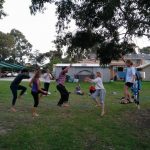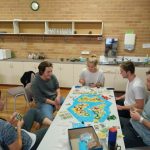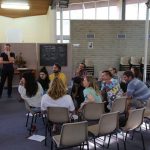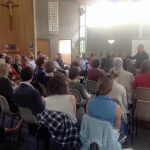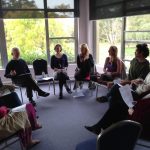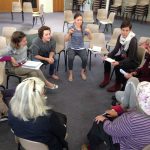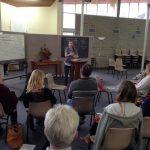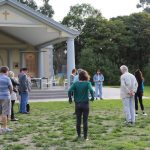My name is Agnieszka and I had the privilege of participating in the Moral Technologies Conference in April 2016.
For me this was not only a a place to learn about new technology; we also enquired into what human beings can do consciously to prepare ourselves to meet Artificial Intelligence in a way that will be moral for the whole of humanity. It was a place to explore and discuss ideas with teenagers and beautifully matured people, who were teenagers many decades ago. It was very enriching to share this conference with people of such varied ages. We also had the opportunity to play – with technology, and in nature without it. We had lots of fun!
At the end of the conference I realised it was a healing experience for me. There was something in the way that the organisers and their helpers held it.
- Was it their acceptance and openness to everyone?
- Was it the warmth they each had?
- Was it the amazing intention they carried of creating an avenue where these hot and important topics could be explored?
I think it was love that they offered us, and with that love we were supported and held by the spiritual beings who are always present when a group of people gather to do the right thing.
Thank you to all the organisers and participants, I shared beautiful moments with you and made new friends.
I left the conference enriched, filled with love and trust that we have the capacities to meet Artificial Intelligence well. We just have to stand up as individuals and groups, and do the work that is required of us – right now.
With gratitude,
– Agnieszka
Nestled away in suburban Melbourne we gathered, people from around the globe, a wonderfully diverse set of age groups, with each being fairly represented. The retreat centre allowed for an intensive, intimate space to be held for us as participants, while we delved into a vast myriad of questions posed to us by Nicanor. The topic was: moral technologies; what is morality and can it be programmed? What is an artificial intelligence (referred to as AI henceforth)? What facet of our consciousness are we programming into the machine? And, last but not least, what does it mean to be human? The broad range of participants in different stages of their life’s journeys made each discussion around these questions extremely colourful, often overflowing from the lecture room to the dining table.
Gradually, over the four days, Nicanor (all the while maintaining an exuberant sense of humour), etched a picture of AI that was akin to a speeding train without any brakes. Beginning with where we are currently placed an example was given from March 2016 wherein an AI, AlphaGo, developed by Google Deepmind, played the person with the second highest amount of victories internationally in the board game ‘Go’, in a 5 game series. The game Go is much more complex than chess, with the amount of possible moves greater than the amount of atoms in the universe. Modelled after our brain’s neural network, AlphaGo was able to learn from over 150,000 games of Go to eventually beat arguably the world’s best player (4-1) and display a faculty beyond pure calculating power, as if mimicking intuition.
From there, we travelled back down the road that led to this point, and then, as throughout the conference, we cast our gaze into the future. Nicanor then contextualized the situation by drawing on a wide array of scientific disciplines such as astrophysics and biology, in order to bring us up to speed on current scientific discoveries, and their implications in relation to previously held paradigms in the scientific world.
The exponential growth in this area of science is in some regards quite frightening as AI can now learn, see, listen, create and rival humans in various aspects of ‘intelligence’. One almost feels compelled to close one’s eyes, block one’s ears and pretend this isn’t happening. The stark reality is that it is happening. The driving forces behind it continually grow stronger with billions of dollars of investment and insatiable human curiosity fanning the flames of passion that push us to recreate a form of intelligence, a new form of life. It is as if we are looking for what it is that makes us what we are. As if we are searching for the mechanism of being, hoping to find God by becoming the Creator. The question then is, what kind of people are creating this intelligence? What are the motives behind its creation and what motivates its actions? Whose morality, whose worldview is imbued? Can an intelligence greater than our own be contained?
I definitely don’t possess the answers, but what became dominantly clear to me over the course of those four days was that through joining together, discussion and discourse we can move towards at least understanding the happenings in the world of AI, and the possible implications, now and in the future, that this technology will have on our lives. Only through participation can the narrative be changed. The choice then is down to the individual; will you swim, or sit placidly, disengaged on the sand, waiting for the waves to wash you away?
I deeply encourage you, dear reader, to choose just one of the many questions present in this piece and have a discussion around it with someone, anyone, maybe a few people; the choice is, once again, all yours.
I would also like to thank each and every single person involved in the Moral Technologies project, your passion and determination to see your ideas become reality is truly inspiring. Special thanks to Rudolf Steiner Book Centre and Seed Australia for providing me with the opportunity to attend, Nicanor for sharing his knowledge, and Sydney Rudolf Steiner College, without which I would never have encountered the incredible people I have met.
– Phil

